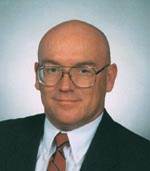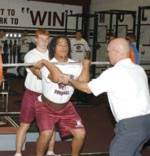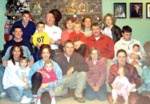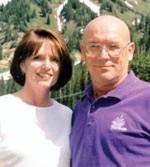MEET BFS CLINICIAN JIM BROWNHere's how BFS National Sales Representative Jim Brown keeps his enthusiasm evergreenBy Kim Goss Published: Winter 2002 Bigger Faster Stronger is an organization developed by coaches for coaches, and that fact has made all the difference since its founding 26 years ago. One of its pioneer clinicians is Jim Brown. A high school coach at Poplar Bluff Senior High School in Poplar Bluff, Missouri, Brown has been involved with BFS for 22 years. A 1976 graduate of the University of Arkansas at Monticello, Brown, who began working in retail in 1973, now has risen to the level of national sales representative for BFS. As a motivational speaker, Brown delivers dozens of BFS clinics throughout the country each year, as well as coaching the program with his own high school athletes in Missouri. He also brings his work home: Coach Brown's son PJ has been using the BFS program since he was old enough to walk. A nationally ranked pole-vaulter in high school (his best vault is 17 feet, 2 inches), PJ now attends The University of Arkansas at Fayetteville as a kinesiology major, where he continues to excel in both athletics and academics. His daughter Mandy Eakin is also a BFS clinician, and his oldest son Michael still holds the BFS national record in the dot drill at 33.37 seconds. BFS is proud to have a coach with Jim Brown's experience and passion for teaching as part of its team. We know you'll enjoy meeting this popular coach and father in this issue of BFS. How did you first learn about BFS? Straight out of BFS magazine. I picked up the magazine one day in 1981 and started reading the articles. When I called the toll-free number to find out more information, BFS Vice President John Rowbotham answered the phone and we spent three-and-a-half hours talking. After that conversation, I was hooked, and not long after that I decided to become a clinician. That must have been some conversation. It was -- Rick and I just clicked. He assured me that I was doing a lot of the right things for my athletes; our philosophies mirrored each other. After you started using the program, what happened with your athletes? Right away we were no longer getting plateaus. In football, we found that we were able to physically manhandle our opponents, even if they were larger than we were. What about long-term success? At Jay High School in Jay, Oklahoma we implemented BFS in a decimated 3A football program that had had only two winning seasons in 13 years. When we left, the group of freshmen we had started with went 13-1 as seniors. Now that's success. What do you remember most about your first year as a BFS clinician? I remember thinking just how far behind our schools were in the training of athletes. How many BFS clinics have you given? About 500 BFS clinics and 15 Be An Eleven clinics, in 44 of the 50 states. I had a chance to go to Alaska, but something came up, and as for clinics in Hawaii, let's just say Greg Shepard has dibs on those! How do you like doing Be An Eleven clinics? I love them! We should have started these 10 years ago. They reflect the valuable teachings of my high school coach, Curtis King at Augusta, Arkansas. How is it you still feel so enthusiastic about running BFS clinics after more than 15 years as a clinician? It's real simple -- there's still a great need for our services! This January will be the start of my 17th year as a BFS clinician, and I'm still raring to go. When was the last time you worked only 40 hours in a week? Probably when I was ten! I love working. What changes have you seen in BFS since you started? The one thing that hasn't changed is we're still a company that is striving to make ourselves better. As far as clinicians it was just Greg, Bob, Rick and myself up until 1990, but now we've grown to 20 because the need has increased. What I really love about our company is every summer we get all our clinicians together in Utah to make certain we're still on the same page, and to plan what we can do to make things better. On a personal note, Greg Shepard has always been there for me as well as for all the other clinicians. Greg has great vision and optimism -- he sees only the greatest in something. He's continually striving to make this company better. BFS isn't the only company out there with plenty to say about improving performance. With all the strength coaching and personal training organizations out there, are coaches generally caught up with the latest research in conditioning and doing most of the right things? We aren't even close to being caught up! We still have coaches who believe that weight training will stunt growth and make athletes muscle-bound. We still have coaches who believe that you should put heat on a turned ankle. And I'm just amazed that coaches will drive 500 miles to learn how to stop a wing-T offense, but they won't drive 50 miles or even stay in their own community to learn how to train their athletes better by attending a BFS clinic. So how do you explain the problem? Bad coaches or bad training information? More often than not, it's that the information is conflicting and overly complicated. People get overwhelmed by it. In fact, I've been involved with one strength coaching organization where you almost need a medical degree to understand some of their literature on training. Also, there is often no unity in some of these organizations, which is one reason why so many college strength coaches got together recently and formed their own organization. So you like BFS's practical and simple approach to training? Exactly. And what really separates a BFS clinic from the rest is that our clinics are full of motivation and we offer hands-on training. Does this attitude carry over into the BFS coaches' certification? No doubt about it. You're not going to read a book and answer a few multiple-choice questions to become a certified strength coach through BFS. You're going to get into the weight room and you're going to learn how to squat and you're going to learn how to teach others to squat. We're coaches helping coaches, and it's this hands-on approach that separates BFS from other certifications. What's a typical clinic experience? Every clinic is special because it's always a thrill for me to see kids doing things they didn't think they could do. One of my favorites was a clinic I gave at Park Falls High School in Park Falls, Wisconsin. At that clinic I met a young football player by the name of Joel Becker. I knew Joel had a lot of potential, but he was being overlooked because his team at the time wasn't having much success. I wrote a personal recommendation for Joel to Southeast Missouri State University in Cape Girardeau, and that helped him receive a partial scholarship. Joel played so well for the school that the partial scholarship turned into a full scholarship and he earned a college degree. Helping Joel fulfill his dreams was one of my most gratifying accomplishments, but there have also been countless others. Give us an idea of the facilities you have at your school. Our weight room is about 3,000 square feet and it's completely carpeted. As for equipment, you could say we have three of everything: three benches, three squat racks, three neck machines, three power clean platforms, three glute-hams, three deadlift platforms, three incline benches, three lat machines and three calf machines. We also have BFS dot drill pads, dip stands, two BFS Lethal Weapons, dumbbells progressing from three to 75 pounds, 18 barbells, and 10,000 pounds of weights. How does your school implement the BFS program in its curriculum? We have weightlifting classes throughout the day, and we use the Beat the Computer program and the logbooks. The program works great for the 500-plus students I work with each year and it's enabled all our sports to be very competitive on a consistent level. The BFS weight training system-what sets it apart? Wh |
 |
|
Jim Brown |
 |
|
Poplar Bluff coaching staffdiscussing the BFS Set-Rep System. (left to right) MikeDormady, Jim Brown, Shane Kearbey, richard Nixon, Mandy Eakin, Andy Chaney |
 |
|
Coach Brwon spots K.C. Legrand, a 3-year, 2-way starter with soph. standout Todd Tinsley who runs a 4.38 forty, spotting. |
 |
|
The Brown Family with five children and nine grandchildren. |
 |
|
Coach Brown with wife Brenda |